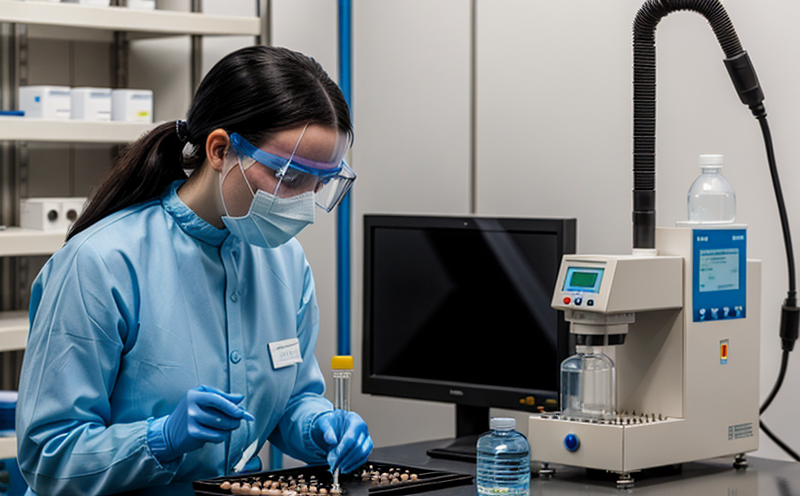Quadrupole Time of Flight MS Testing
Quadrupole Time-of-Flight Mass Spectrometry (Q-TOF MS) is a powerful analytical technique widely used in pharmaceutical testing for chemical characterization and impurity profiling. This advanced technology offers high resolution, mass accuracy, sensitivity, and speed, making it an essential tool for ensuring the purity and quality of pharmaceutical products.
In the context of the pharmaceutical industry, Q-TOF MS is crucial for identifying and quantifying compounds within a sample. This includes the primary drug substance, excipients, as well as any impurities or degradation products that may be present. The technique allows for the precise determination of molecular weights and isotopic distributions, which are critical in understanding the chemical structure of the substance under investigation.
The testing process involves several key steps: sample preparation, injection into the mass spectrometer, ionization, separation based on mass-to-charge ratio, and finally detection. The quadrupole mass filter ensures that only ions with specific m/z ratios pass through to the time-of-flight (TOF) analyzer. Here, the ions are accelerated and their flight times measured to determine their exact masses.
This method is particularly advantageous when dealing with complex mixtures or isotopically labeled compounds where high resolution and mass accuracy are required. The ability of Q-TOF MS to provide detailed information about molecular fragmentation patterns can also aid in the identification of unknown compounds, which is invaluable for both R&D and compliance purposes.
The results from Q-TOF MS testing play a pivotal role in various aspects of pharmaceutical development and production. They are used during drug discovery to identify potential active pharmaceutical ingredients (APIs) and their metabolites. During the manufacturing phase, these tests ensure that the final product meets stringent quality standards set by regulatory bodies such as the FDA, EMA, and WHO.
For quality managers and compliance officers, Q-TOF MS testing offers a robust means of ensuring adherence to Good Manufacturing Practices (GMP) and Good Laboratory Practices (GLP). The data generated from these tests can be used to demonstrate compliance with international standards like ISO 17025 for laboratory accreditation.
In summary, Quadrupole Time-of-Flight Mass Spectrometry is an indispensable tool in the pharmaceutical sector. Its ability to provide detailed and accurate information about chemical structures makes it a cornerstone of modern analytical chemistry within this industry.
Quality and Reliability Assurance
- High Resolution: Q-TOF MS can resolve closely related compounds with high precision, which is crucial for impurity profiling and ensuring drug purity.
- Mass Accuracy: The system provides mass accuracy within 0.1 Da or better, essential for accurate quantification of compounds in pharmaceuticals.
- Sensitivity: Q-TOF MS offers high sensitivity down to parts per million levels, allowing for the detection and identification of trace impurities.
- Speed: The rapid acquisition rate of Q-TOF MS enables quick turnaround times for complex analyses, which is beneficial in a fast-paced industry like pharmaceuticals.
Customer Impact and Satisfaction
The use of Quadrupole Time-of-Flight Mass Spectrometry has significantly enhanced the quality control processes within the pharmaceutical sector. By providing accurate, detailed, and reliable data, this technology ensures that only high-quality products reach the market. This not only enhances customer satisfaction but also builds trust in brand reputation.
Customers, including healthcare providers, patients, and regulatory authorities, rely on consistent product quality to ensure effective treatment outcomes. Q-TOF MS testing helps pharmaceutical companies meet these expectations by identifying and addressing potential issues early in the development process, thus minimizing the risk of substandard products reaching the consumer.
The accuracy and reliability provided by this technology contribute to better patient outcomes and improved public health. For compliance officers and quality managers, Q-TOF MS testing offers peace of mind that regulatory standards are being met or exceeded. This ensures that the company remains compliant with global pharmaceutical regulations, thereby avoiding costly recalls and legal issues.
Competitive Advantage and Market Impact
The adoption of Quadrupole Time-of-Flight Mass Spectrometry as a standard testing method gives companies a significant competitive edge in the pharmaceutical market. The ability to offer products with superior quality control and compliance can differentiate them from competitors, leading to increased customer loyalty and market share.
Pharmaceutical companies that invest in advanced technologies like Q-TOF MS are better positioned to innovate and develop new drugs more efficiently. This capability is particularly important given the increasing complexity of drug development and the stringent regulatory environment. By being able to quickly identify impurities or structural modifications, these companies can accelerate their product lifecycle management.
The use of such advanced testing methods also enhances a company’s reputation as a leader in pharmaceutical innovation. This can attract top talent, secure partnerships with leading research institutions, and foster strategic alliances that drive further growth and success.





